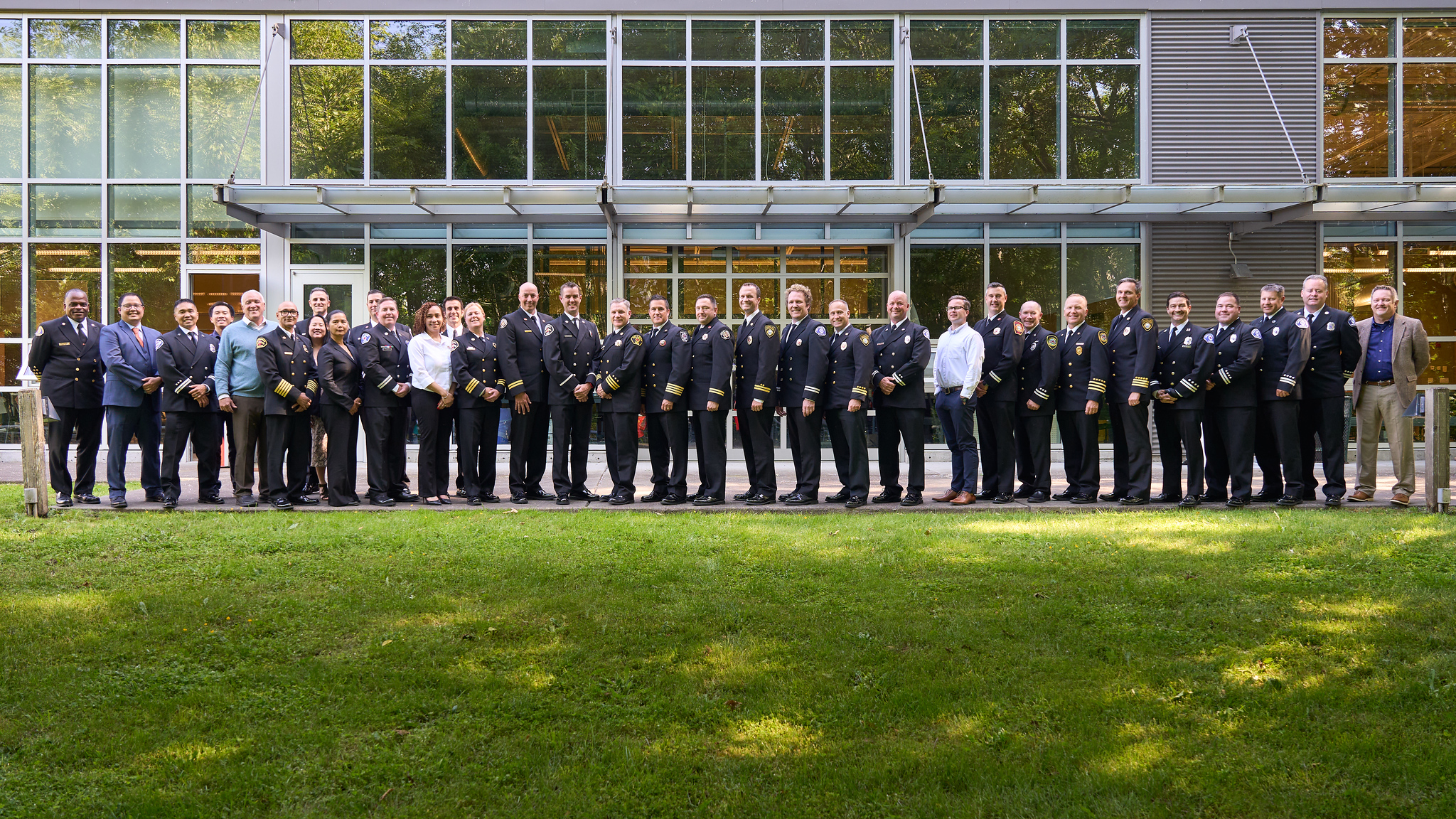
Foster Faculty Develop Leadership Training for Fire Service Leaders
Foster School partnership empowers Pacific Northwest fire services leaders to innovate and inspire
Firefighters typically aren’t among the technology officers, marketing executives, or sales leaders in a business school’s leadership training programs. However, thanks to an innovative partnership between fire departments and the UW Foster School of Business, Professors Bruce Avolio and Christina Fong are helping the next generation of fire services leaders lead more effectively.
Developing the Seattle Fire Department Executive Leadership Academy
Avolio and Fong are co-founders with Chief Harold Scoggins of the Seattle Fire Department Executive Leadership Academy (SFD ELA) at Foster’s Center for Leadership and Strategic Thinking (CLST). Since 2018, they have provided leadership training on topics including creating positive team dynamics, inclusive leadership, organizational climate and culture, strategic thinking, and leadership to nearly 100 senior fire officers from across the Pacific Northwest.
Avolio and Fong created SFD ELA to fill a gap. For first responders growing into more senior management and leadership roles, learning more effective ways to lead in their organizations and how to foster their employees’ well-being and mental health is vital. However, these skills aren’t part of the traditional training for firefighters, who receive much more emphasis on technical skills.
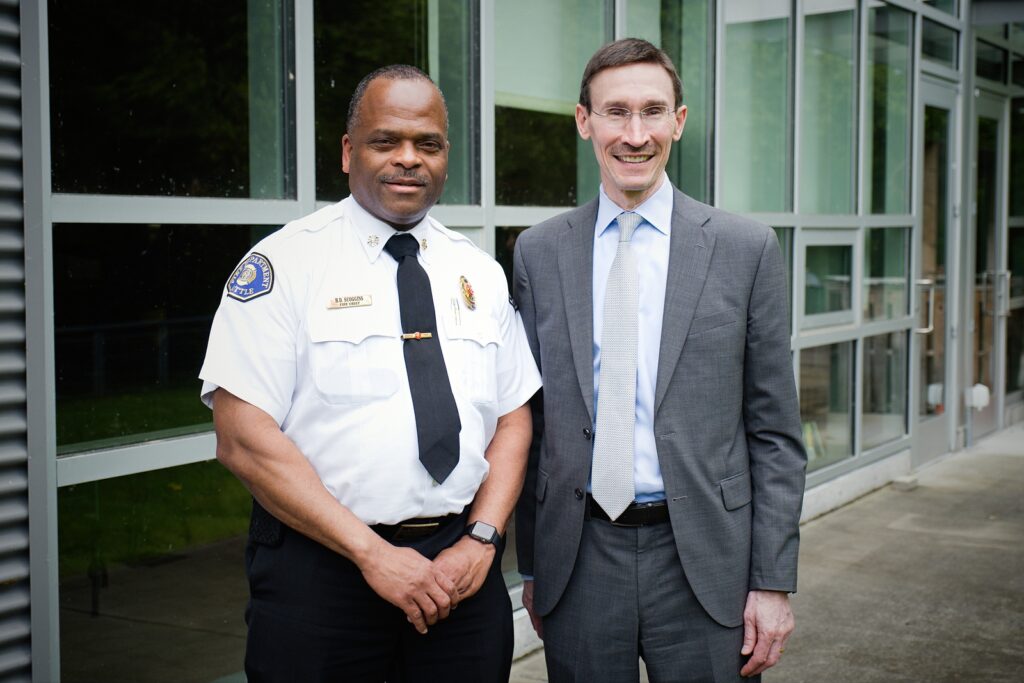
“In the fire service, we think about the tactical officer out in the field as the leader. But what we find is when that person gets in a position of authority and is leading people, not just making tactical decisions, there are some gaps there,” says Seattle Fire Chief Harold Scoggins. “This program was designed to help with the difference between the two and to address the gaps in fire service leadership. Christina and Bruce have done an amazing job helping us with that.”
Leadership training that inspires
Avolio and Fong incorporate their research and the best practices of leading local companies into the 15-month Academy curriculum. The leadership training program facilitates what Fong says are mutually beneficial collaborations between fire service leaders and executives from companies including Alaska Airlines, Adaptive Bio-Technologies, and the athletic apparel company Brooks. Fire services leaders share their experiences in life-and-death situations, and private sector leaders discuss strategies from very different circumstances.
“Our curriculum is very much seeded in the Fire Services,” Fong says. “But many leadership principles are universal. SFD ELA is unique in that fire service personnel learn about principles, challenges, and opportunities from experts outside of fire services. We certainly talk about what’s happening within fire services, but in many of the sessions we bring in a guest speaker or a case study from outside of fire services to deepen the participants’ understanding and knowledge.”
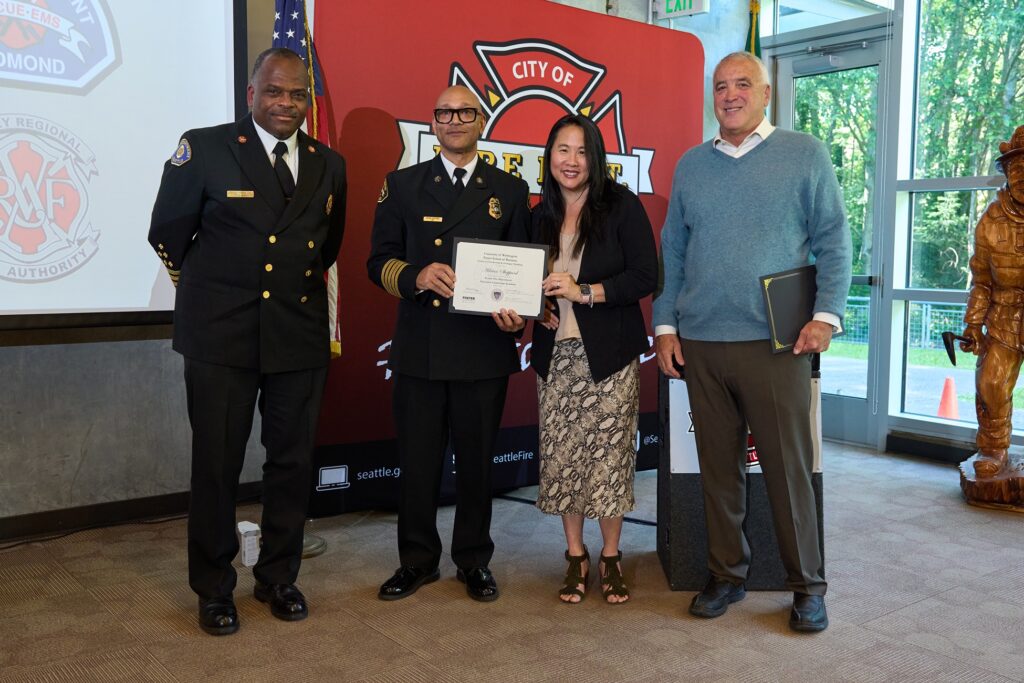
“When we think about the Foster School’s purpose statement — Together, We Foster Leaders, We Foster Insights, We Foster Progress to Better Humanity — this is a prime example of that being enacted,” Fong says. “It feels extraordinarily meaningful to help accelerate the leadership development of fire services leaders because we get to see the direct impacts of creating a stronger team and stronger leaders in the community. It is one of the best examples of what a business school can and should be doing.”
Leadership training that benefits the community
The 2024 cohort, which included fire service leaders from Seattle, Bellevue, Renton, and many other local departments, recently concluded its first year. Attendees spanned roles and regions, from Captains to Chiefs. However, all shared a desire to expand their leadership skills beyond just doing the technical aspects of the job and to work on team projects that could advance their profession. The officers in the SFD ELA work on team projects that emphasize areas to innovate in fire services and promote cross-department collaboration. Proposals included forming a mentorship program within the fire services, new approaches to recruiting and retaining firefighters, and emphasizing the well-being and mental health of those in fire services.
The projects achieve several complementary goals. They require teamwork on a project outside traditional fire services for which participants receive professional coaches and a mentor—a Chief from the advisory board. They enable fire service leaders to improve their presentation and public speaking skills. They also serve as a source of important potential innovations for the future of fire services.
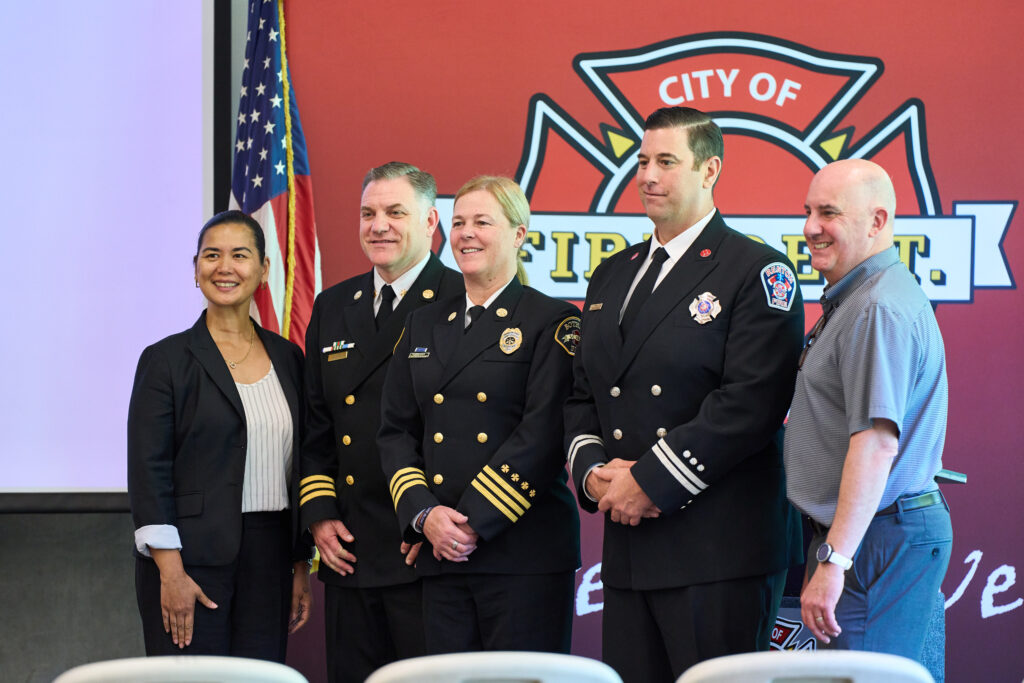
Scoggins said he was “very impressed” with the leadership training program presentations. Both he and Avolio noted the emphasis the teams placed on mental health. Team presentations included data showing firefighters have higher suicide rates per capita than nearly any other profession and that 45% of fire services staff feel that untreated stress may cause them to leave the fire service.
“I am struck by how many in one of our most trusted professions are going through this,” Avolio said. He noted that fire services personnel were tasked with administering COVID tests during the pandemic and that the profession is on the front lines of a myriad of public safety issues. Yet, like most first responders, this profession is under duress and is stressed.
This highlights the importance of the program in training effective, compassionate, inclusive, and strategic leaders for the benefit of fire service personnel and, in turn, the community they serve.
Honing a different set of skills
“It is very important to work on the soft skills, to grow and develop them,” said Redmond Fire Chief Adrian Sheppard, a member of the 2024 cohort. “It was a growth opportunity for me to come in and learn not only from other firefighters but from the academics as well. One of my key takeaways was the emphasis on metacognitive thinking. Going back and studying that, thinking about thinking, enriched my experience and adapted how I approach issues.”
Sheppard’s experience is just what Avolio and Fong had in mind when they originally conceived the program after Scoggins contacted the professors seeking advice on developing leaders in the Seattle Fire Department. Avolio and Fong collaborated with an advisory board of fire department leaders to develop a curriculum customized for fire services that incorporates the management principles in which they are nationally recognized experts.
“They bring the issues, we bring the frameworks and models, and we meet in the middle,” Avolio says.
When the job hits home
SFD ELA also provides the opportunity for fire services officers to learn from one another. As shared by Captain Gabriel DeBay of the Shoreline Fire Department in his commencement speech, this year’s cohort received a particularly inspirational lesson from Captain Marcus Howle of the Bellevue Fire Department. Howle was participating in a class on authentic leadership, in which participants were instructed to bring an artifact with personal meaning to them.
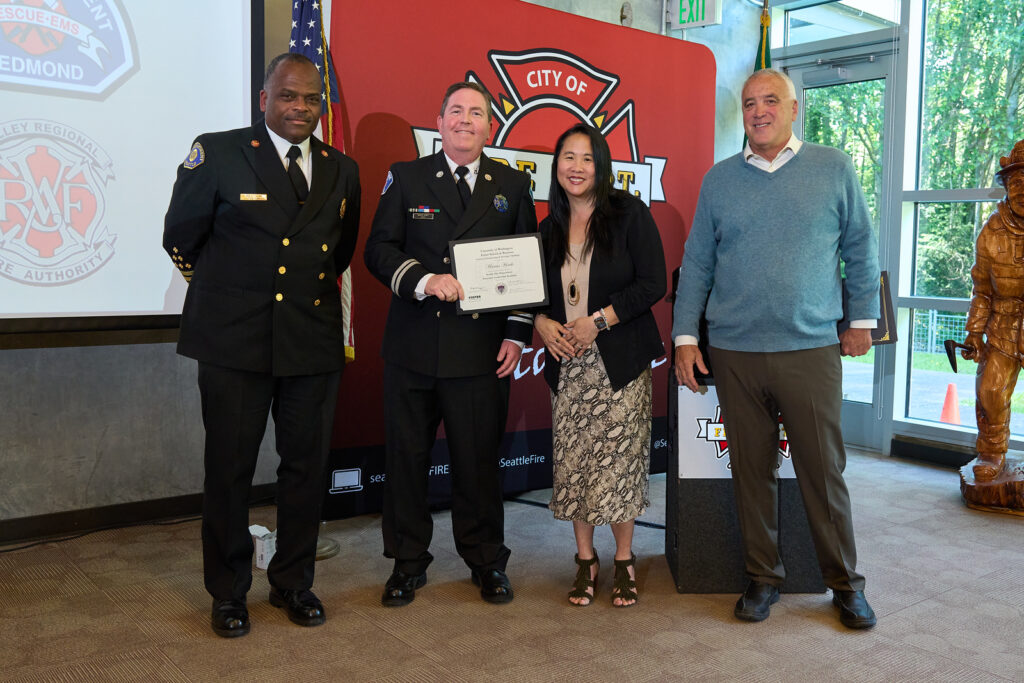
“One of the members of our cohort walked up with nothing in hand,” DeBay said. Just months earlier, Howle had been on duty when a call to respond to a house fire came into the station – the address was Howle’s own home. Fortunately, his family was not hurt, but his home was destroyed in the fire. Howle explained to his classmates why he was empty-handed and had chosen to continue in the program despite the extraordinarily difficult circumstances.
“He taught us that being a leader requires resiliency,” DeBay said. “He was a leader for his crew that night, for his family, and for the citizens he serves every day by continuing his education. He would have had every excuse (to drop out of the program). Instead, he kept coming here to be an even better leader. And that’s pretty amazing.”
Howle is characteristically modest about the remarkable incident but proud of the opportunity it provided to inspire his classmates. “Not a lot of us get to live in the cities that we work in. I am very fortunate to live in the city of Bellevue and get to work there. It was the worst night of my life to get a call from my wife and then within minutes get dispatched to a fire at my own house. I still haven’t really processed it.
“But I didn’t want to give up on that. I know that this is what I want to be doing. I am good at the Xs and Os and the tactical stuff, but I need to develop myself more as a leader, so I wanted to continue with this program. It just so happened that we had to bring an artifact and I had lost most of the artifacts in my home, so I got a chance to go up there and own it. I didn’t do this assignment, and here is why. But I am here, and I am going to continue, and I think that was inspiring to the rest of the cohort.”
Fostering the next generation of fire services leaders
Each year the SFD ELA has grown in terms of how it accelerates the leadership development of participants using an increasing array of evidence-based practices during this 15-month program. In this next year, the SFD ELA Advisory Board will be discussing the potential launch of an “Emerging Leaders Academy”, which would be focused on developing leadership among fire services personnel who are now below the rank of captain level for sworn in fire fighters and a similar rank for non-sworn in support staff that are all interested in taking on more leadership roles in their careers.
In August 2024, the leadership training program will start recruiting the next cohort of ELA participants for the 2024-25 Academy. Application details can be found in this flyer or in this link.
Learn more about the Foster School of Business Center for Leadership and Strategic Thinking (CLST) here.
